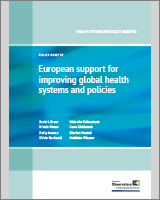NCBI Bookshelf. A service of the National Library of Medicine, National Institutes of Health.
Key messages
- The EU has huge impact – and huge potential impact – on global health. It is one of the world’s largest markets, aid donors, health care innovators and trading powers. It influences global health and health policy directly and indirectly, through its explicit global health policies and through the effect of its other policies on global health.
- There is growing recognition that a more coherent EU approach to global health could strengthen its governance and improve global health policies, due in part to the momentum created by COVID-19.
- The 2022 EU Global Health Strategy and 2024 Council conclusions EU global health strategy – better health in a changing world set out principles for the future that reflect EU values and a commitment to: better health and well-being across the life course; stronger health systems; and action to prevent and combat health threats.
- There is scope for more purposeful efforts to create synergies between EU policy instruments and global health. This means aligning policies that were deliberately designed to address global health and those with unintended (spillover) impacts. It also means coordinating diverse Commission directorates and agencies and other EU actors such as the External Action Service and European Investment Bank.
- There are five ‘obvious’ EU policy areas where instruments could be aligned with global health goals: trade in goods and services; public investment and fiscal instruments; official development assistance and humanitarian aid; solidarity, voice and multilateralism; and research and training. There are other important areas that could also be aligned, such as climate change policy.
- Repurposing existing policy instruments in areas such as those to advance global health is not straightforward because:
- ◦
the instruments were typically developed to meet specific (non-health) needs and are ‘owned’ by teams who are not primarily focused on global health
- ◦
adjusting instruments to encompass global health objectives can imply some pooling of sovereignty, which Member States may be reluctant to endorse
- ◦
EU policy action on global health takes place in a crowded arena with multilateral organizations, non-governmental actors, and private and philanthropic institutions, and can unintentionally cut across other initiatives.
- Collective and careful work with EU policy communities can help integrate new, global health-focused, approaches into ‘non-health’ areas despite their established legal and political frameworks.
- Building consensus around a vision of global health with national governments across the EU can address concerns about sovereignty and foster commitment.
- EU coordination across agencies and engagement with multilateral forums can help harmonize global health approaches and reduce duplication and fragmentation.
- EU global health tools need to be ‘managed’ in context and this means being clear about:
- ◦
which of the four types of instrument they involve: policy; funding; information; or technical support
- ◦
the geographical context in which the instrument will be used and whether or not this categorization is relevant to the coherence of the global health policies.
Contents
About the Series
Address requests about publications of the WHO Regional Office for Europe to:
Publications
WHO Regional Office for Europe
UN City, Marmorvej 51
DK-2100 Copenhagen Ø, Denmark
Alternatively, complete an online request form for documentation, health information, or for permission to quote or translate, on the Regional Office website (www.who.int/europe/about-us/contact-us).
All rights reserved. The Regional Office for Europe of the World Health Organization welcomes requests for permission to reproduce or translate its publications, in part or in full.
The designations employed and the presentation of the material in this publication do not imply the expression of any opinion whatsoever on the part of the World Health Organization concerning the legal status of any country, territory, city or area or of its authorities, or concerning the delimitation of its frontiers or boundaries.
The mention of specific companies or of certain manufacturers’ products does not imply that they are endorsed or recommended by the World Health Organization in preference to others of a similar nature that are not mentioned. Errors and omissions excepted, the names of proprietary products are distinguished by initial capital letters.
All reasonable precautions have been taken by the World Health Organization to verify the information contained in this publication. However, the published material is being distributed without warranty of any kind, either express or implied. The responsibility for the interpretation and use of the material lies with the reader. In no event shall the World Health Organization be liable for damages arising from its use. The views expressed by authors, editors, or expert groups do not necessarily represent the decisions or the stated policy of the World Health Organization.
This policy brief is one of a new series to meet the needs of policy-makers and health system managers. The aim is to develop key messages to support evidence-informed policy-making and the editors will continue to strengthen the series by working with authors to improve the consideration given to policy options and implementation.
Box
What is a Policy Brief?
- European support for improving global health systems and policiesEuropean support for improving global health systems and policies
Your browsing activity is empty.
Activity recording is turned off.
See more...
